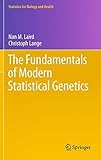The Fundamentals of Modern Statistical Genetics / by Nan M. Laird.
Tipo de material: TextoSeries Statistics for Biology and HealthEditor: New York, NY : Springer New York, 2011Descripción: xiv, 226 páginas recurso en líneaTipo de contenido:
TextoSeries Statistics for Biology and HealthEditor: New York, NY : Springer New York, 2011Descripción: xiv, 226 páginas recurso en líneaTipo de contenido: - texto
- computadora
- recurso en línea
- 9781441973382
- QA276-280
Springer eBooks
Introduction to statistical genetics and background in molecular genetics -- Principles of inheritance: mendel's laws and genetic models -- Some basic concepts from population genetics -- Aggregation, heritability and segregation analysis: modeling genetic inheritance without genetic data -- The general concepts of gene mapping: Linkage, association, linkage disequilibrium and marker maps -- Basic concepts of linkage analysis -- The basics of genetic association analysis -- Population substructure in association studies -- Association analysis in family designs -- Advanced topics -- Genome wide assocation studies -- Looking toward the future.
This book covers the statistical models and methods that are used to understand human genetics, following the historical and recent developments of human genetics. Starting with Mendel’s first experiments to genome-wide association studies, the book describes how genetic information can be incorporated into statistical models to discover disease genes. All commonly used approaches in statistical genetics (e.g. aggregation analysis, segregation, linkage analysis, etc), are used, but the focus of the book is modern approaches to association analysis. Numerous examples illustrate key points throughout the text, both of Mendelian and complex genetic disorders. The intended audience is statisticians, biostatisticians, epidemiologists and quantitatively- oriented geneticists and health scientists wanting to learn about statistical methods for genetic analysis, whether to better analyze genetic data, or to pursue research in methodology. A background in intermediate level statistical methods is required. The authors include few mathematical derivations, and the exercises provide problems for students with a broad range of skill levels. No background in genetics is assumed. Dr. Laird is a Professor of Biostatistics in the Biostatistics Department at the Harvard School of Public Health. Dr. Laird has contributed to methodology in many different fields, including missing data, EM-algorithm, meta-analysis, statistical genetics, and has coauthored a book with Garrett Fitzmaurice and James Ware on Applied Longitudinal Analysis. She is the recipient of many awards and prizes, including Fellow of the American Statistical Association, the American Association for the Advancement of Science, the Florence Nightingale Award, and the Janet Norwood Award. Dr. Lange is an Associate Professor in the Biostatistics Department at the Harvard School of Public Health. After his PhD in Statistics at the University of Reading (UK), he has worked extensively in the field of statistical genetics. Dr. Lange has been the director of the Institute of Genome Mathematics at the University of Bonn and has received several awards in mathematics and genetics. Dr. Lange is the developer of the PBAT package.
Para consulta fuera de la UANL se requiere clave de acceso remoto.


